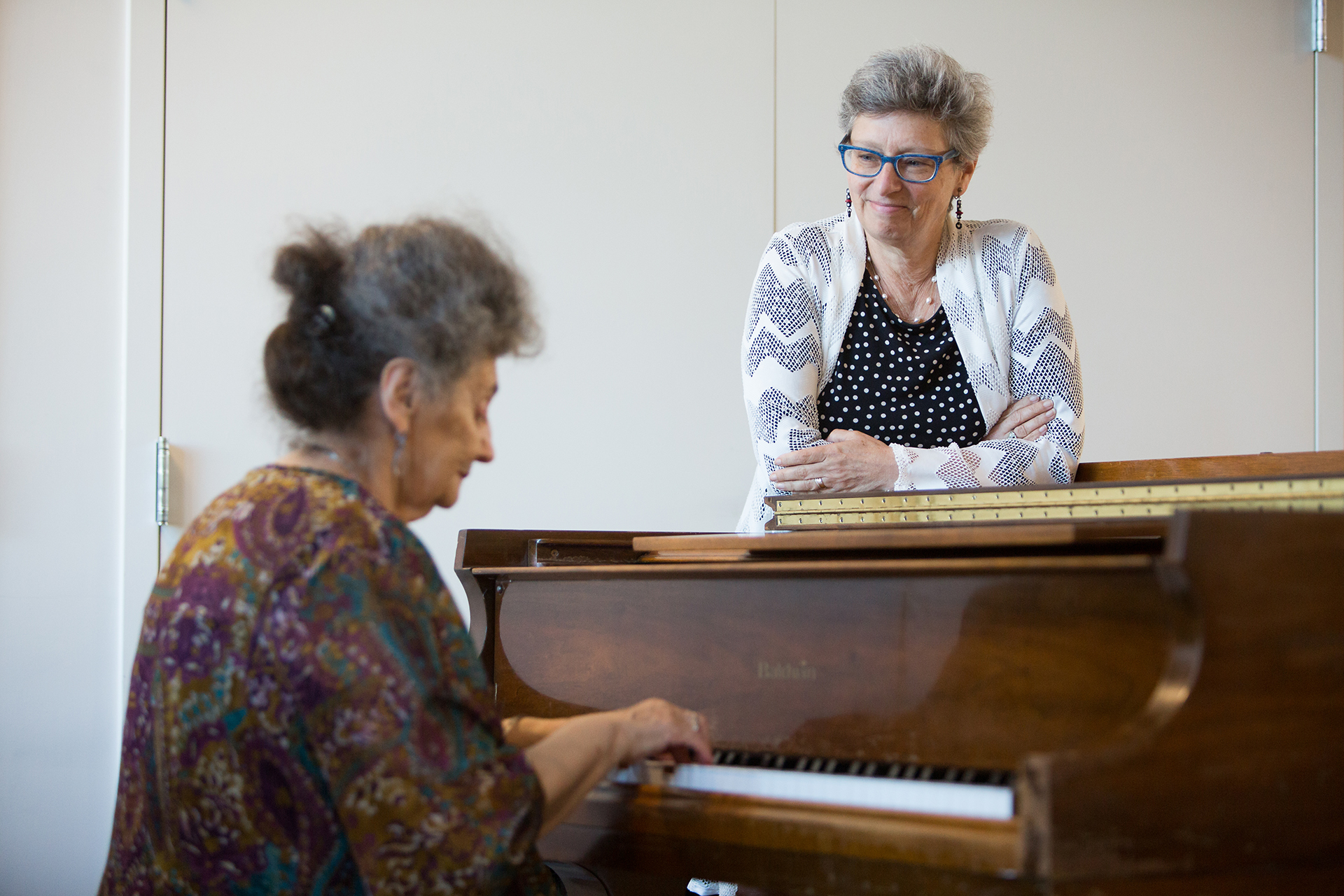Affordable Communal Living for Boston-Area Seniors
-
-
Slice of MIT
Filed Under
Recommended

Amy Schectman MCP ’82 believes all seniors have the right to a life rich with connection and purpose—and that the key to providing that life is community. “We’re wrong to think people should be aging in place alone,” says Schectman, president and CEO of 2Life Communities, an innovative affordable housing network in Greater Boston. “People do so much better with social support.”
Community and social support have been cardinal points in Schectman’s life since she began volunteering at a Stamford Connecticut Girls’ Club in middle school. As an undergraduate at Johns Hopkins, she worked with an organization that aggregated several urban Baltimore grassroots groups into a single, more powerful coalition. She took her first job at a nonprofit economic policy and research center in Washington, DC. “I thought about law school, perhaps with a joint degree in social work,” she says.
While considering her next steps, she noticed Harvard Law had a joint program with the Department of Urban Studies and Planning (DUSP) at MIT. Urban planning was not a field she knew. The more she learned about it, however, the more she understood how valuable that discipline could be in advancing the social justice work she cared about—particularly in the areas of affordable housing and finance. So she shelved the law school idea and enrolled at DUSP.
Schectman says she loved studying social science in an environment pitched around science, engineering, and math. “There were days when I would look at the caliber of people who studied and worked at MIT and pinch myself,” she recalls. “And that atmosphere taught me how to focus on an individual objective while recruiting allies and partners along the way.”
Setting goals and building consensus would become constants in Schectman’s career. In 1983, master’s degree in hand, Schectman took a job in the Massachusetts Division of Capital Planning with former DUSP head Tunney Lee. She later returned to DUSP as a lecturer, then joined the Boston Housing Authority (BHA), where she secured two $50 million Hope VI grants from the US Department of Housing and Urban Development to revitalize two troubled Boston public housing facilities. Later, as economic development officer in the town of Brookline, Massachusetts, she helped negotiate a deal between property owners, the town of Brookline, and a senior housing developer to preserve several affordable senior housing projects scheduled for transition to market-rate housing. The developer, Hebrew SeniorLife, was so impressed with her work that the company hired her to oversee the design and permitting of its new facility in nearby Dedham.
“I wish I could tell you I was clever enough to have plotted all of these chapters,” she reflects. “But I’m not. My life has been a happy and continuous story of serendipity.”
In 2010, in her most recent serendipitous turn, Schectman became CEO and president at Jewish Community Housing for the Elderly (recently rebranded as 2Life Communities to reflect the comprehensiveness of the organization’s work). The organization maintains more than 1,200 affordable senior housing units in eight buildings across Greater Boston, cobbling together federal, state, and municipal funds with philanthropic donations to provide outstanding care to seniors whose average income is $10,800.
We’re wrong to think people should be aging in place alone.
Schectman, who was named to the Massachusetts Governor’s Council on Aging in 2018 and recently became president of the board of Citizens’ Housing and Planning Association, is one of several DUSP alums at 2Life. The organization’s real estate team includes Lizbeth Heyer MCP ’92, chief of real estate and innovation; Zoe Weinrobe MCP ’04, director of real estate innovation; Elise Selinger MCP ’16, real estate innovation manager; and Rachel Belanger MCP ’17, project manager.
The 2018 figures at 2Life Communities indicate its impressive scope: 21,337 hours of volunteer service from residents and community members; 3,388 multilingual nurse visits; 1,032 exercise classes. Each year, only about 2 percent of its residents move to full-time nursing care (which is available within its communities), and the average age at which they do so is 88, compared with the national average of 79. 2Life’s staff is particularly attuned to the needs of residents—able to assist them in applying for food stamps or enrolling in state health programs. “And all of our staff is trained in dealing with dementia—even and especially the maintenance people,” Schectman says. “They’ll be called to a home to fix a sink or tub, and check to see if there’s food in the refrigerator.”
Schectman’s current challenge—and one of the major challenges in the senior care field—is providing quality housing and care for middle-income seniors who have too much money to qualify for subsidized housing but too little money to afford high-end “cruise ship” senior communities. Her strategy, again, starts with building community and coalition. “We need to find value in the people who will live in those communities,” she says. “To turn the senior community into a sort of co-housing with a commitment to social justice, where residents keep costs in check by negotiating with caterers and ride hailing companies, coordinating community potluck dinners, offering classes and leading discussion groups, and staffing phones and offices. And by participating, the residents will feel even more invested in their community.”
Photo: At 2Life’s campus in Brighton, Massachusetts, Amy Schectman watches resident Tatyana Faynberg playing the piano. Credit: Ken Marcou.







